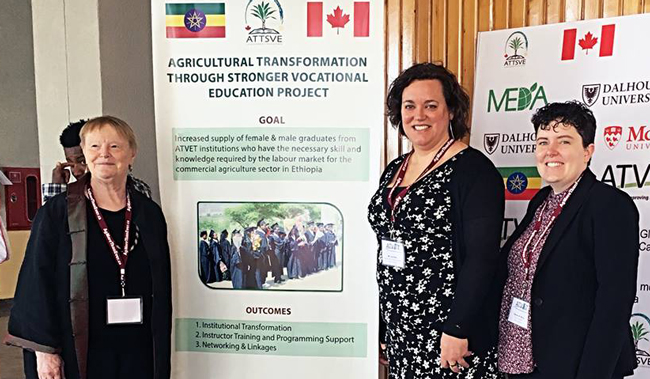
Two ongoing research projects led by Professors Claudia Mitchell and Lisa Starr, of the Faculty of Education’s Department of Integrated Studies in Education (DISE), are helping to understand how women in Ethiopia can empower themselves to protect their human rights, and to benefit equitably from development in the country.
Mitchell and Starr are currently carrying out a study of gender-based violence on the campuses of four Agriculture Technical Vocational Education and Training (ATVET) colleges in Ethiopia. Building on a survey as well as a college-based participatory analysis of the data, the study, funded by Global Affairs Canada, is part of a larger project: ATTSVE (Agricultural Training Through Stronger Vocational Education).
In keeping with Canada’s new Feminist International Assistance Policy, which has as its main focus of programming efforts for Global Affairs Canada to promote gender equality, this component of ATTSVE aims to promote gender equity and gender mainstreaming, and to combat gender-based violence within the ATVET system. Their projects have placed two interns in the field in Ethiopia this summer: Hani Sadati, doctoral student in DISE, and Adrianna Lemieux, undergraduate student with McGill’s Faculty of Arts.
The Agricultural Training Through Stronger Vocational Education (ATTSVE) project (Dalhousie, McGill University, Jimma University and MEDA) is working with staff from colleges in Maichew, Nedjo, Wolaita Soddo, and Woreta. The six-year project aims to help move Ethiopia towards a market-focused agricultural system better poised to support the country economically, while meeting the needs of both male and female farmers and youth, and the agriculture industry.
Agriculture forms the base of the East African country’s economy. The most populous landlocked country in the world, Ethiopia’s 88 million inhabitants rely on agriculture for 80 per cent of their total employment and 84 per cent of their exports, while agriculture accounts for only half of their gross domestic product. Soil degradation, overgrazing, deforestation and poor infrastructure are contributing factors.
Professors Starr and Mitchell’s project with the in-country partners of the AATSVE project has three broad objectives:
- To advance women’s equal participation with men as decision-makers in shaping the sustainable development of their societies,
- To support women and girls in the realization of their full human rights, and
- To reduce gender inequalities in access to, and control over, the resources and benefits of development.
Concurrently, the Setouch le Setouch (women to women) forum is working to understand how Ethiopian and South African women understand and enact leadership in their communities. The goal is to empower leadership capacity among women connected to the ATVET system. Presently, women are vastly under-represented in teaching and management positions at all ATVETs in Ethiopia. Women occupy less than five per cent of the senior leadership and teaching positions in any of the ATVETs. Currently, each ATVET is developing a strategic plan that has targets related to supporting female students, women instructors, and mainstreaming gender across the curriculum, but much is left to do.
A key area in each ATVET’s gender strategy is to address the engagement, mobilization and retention of female leaders within the colleges. This area includes addressing the structural and cultural barriers to equitable treatment and involvement of women. Through participation in the Setouch le Setouch forum ATVET female instructors, students and administrators will be empowered to reach their full potential and directly contribute to the success of each ATVET through community outreach. The forum is an initiative of the ongoing research project Setouch le Setouch: Investigating Ethiopian and South African Women’s Leadership Beliefs and Actions, of which Lisa Starr is Principal Investigator.
